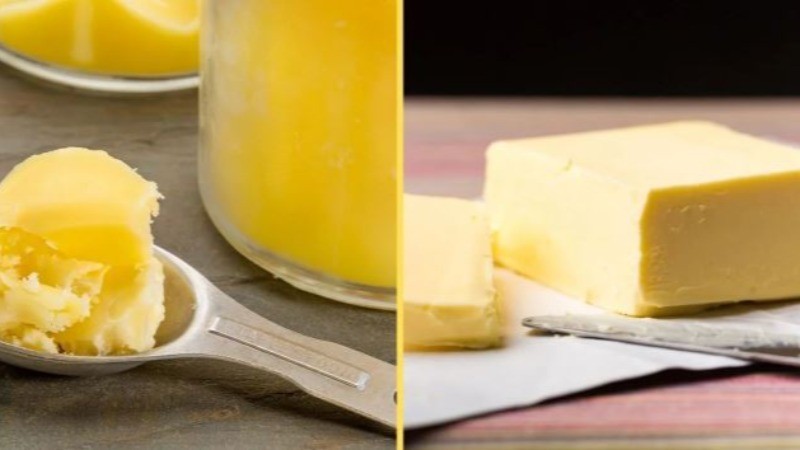
In the realm of traditional and modern cooking, ghee and butter are two popular ingredients often discussed for their health benefits and culinary applications. Both are staples in various cuisines, particularly in Indian cooking. However, a common question that arises is which one—ghee or butter—is better for health. To provide clarity on this topic, we turn to the insights of Dr. Ravi K. Gupta, a renowned hematologist-oncologist from the USA, who has shared his expert opinion on this subject through a detailed video on Instagram.
Understanding Ghee and Butter
Ghee is clarified butter made by heating butter to separate the milk solids and water from the fat. This process removes the lactose and casein, making ghee a suitable option for those who are lactose intolerant or have dairy sensitivities. The remaining product is a golden, aromatic fat with a high smoke point, which is ideal for high-temperature cooking.
Butter, on the other hand, is made by churning cream to separate the butterfat from buttermilk. It contains milk solids, including lactose and casein, which can be problematic for some individuals. Butter has a lower smoke point compared to ghee, which limits its use for high-heat cooking.
Nutritional Comparison
Both ghee and butter are rich in essential nutrients, but their nutritional profiles have distinct differences:
Vitamins and Minerals: Both ghee and butter contain vitamins A, E, and D, as well as calcium and phosphorus. These nutrients play crucial roles in maintaining bone health, supporting the immune system, and promoting overall well-being.
Fat Composition:
Ghee: Contains a high proportion of monounsaturated fats and some polyunsaturated fats. Monounsaturated fats are considered heart-healthy and can help increase HDL (high-density lipoprotein) or "good" cholesterol levels. Ghee also includes conjugated linoleic acid (CLA), which may support fat loss and muscle gain.
Butter: Primarily composed of saturated fats, which can raise LDL (low-density lipoprotein) or "bad" cholesterol levels when consumed in excess. Saturated fats are linked to an increased risk of heart disease, making butter less favorable from a cardiovascular health perspective.
Health Benefits and Drawbacks
Ghee:
Digestibility: Ghee is lactose-free and easier to digest compared to butter. It is a good choice for individuals with lactose intolerance or those who experience digestive issues with dairy products.
Cooking Stability: Ghee has a high smoke point, which makes it stable at high temperatures and less likely to form harmful compounds during cooking.
Anti-Inflammatory Properties: Ghee contains butyrate, a short-chain fatty acid that may have anti-inflammatory effects and support gut health.
Butter:
Taste and Texture: Butter adds a rich flavor and creamy texture to dishes, making it a popular choice for baking and cooking. However, its lower smoke point can lead to the production of potentially harmful compounds if overheated.
Lactose Content: Butter contains lactose and casein, which can cause digestive issues for some people. It may also contribute to weight gain if consumed in large amounts due to its high calorie content.
Expert Recommendations
According to Dr. Ravi K. Gupta, a tablespoon of ghee contains approximately 125 calories, while the same amount of butter has about 100 calories. Despite this minor calorie difference, ghee is generally considered more beneficial due to its healthier fat composition and digestibility. The high-quality fats in ghee can positively impact cholesterol levels and overall cardiovascular health.
In summary, while both ghee and butter offer unique flavors and benefits, ghee emerges as the more health-conscious choice, especially for those with lactose intolerance or concerns about heart health. Its higher smoke point, healthier fat profile, and digestibility make it a preferred option for daily cooking. However, butter can still be enjoyed in moderation for its taste and culinary properties. Balancing both in your diet according to your health needs and preferences can be a practical approach.
Onam Festival: Delicious Food Tips to Make Your Celebration Special
Ayushman Bharat Expands to Seniors 70 and Over: Benefits for Women and New Application Process
International Chocolate Day: Indulge in the Ultimate Mood-Booster in THIS Day